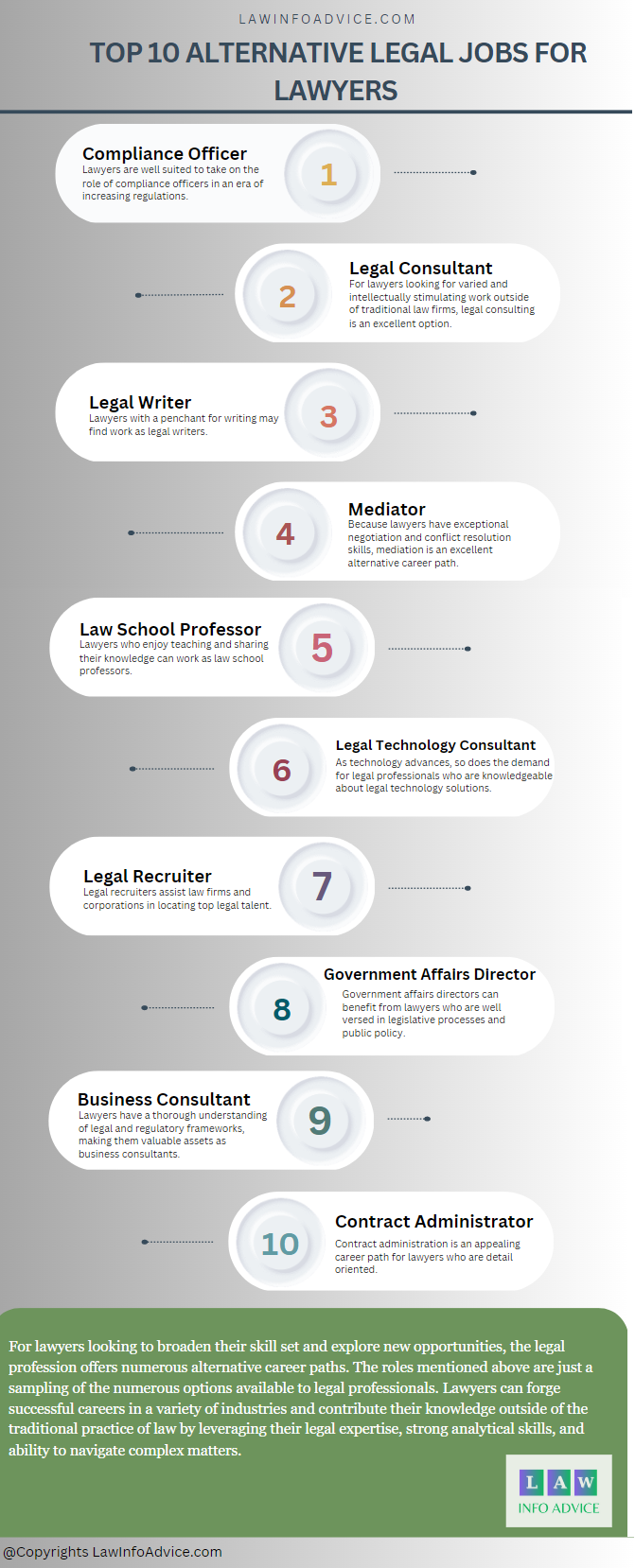Introduction:
Lawyers have specialized skills that extend beyond the courtroom. While practicing law is many legal professionals' traditional career path, there are numerous alternative job opportunities that leverage their expertise and provide fulfilling and lucrative career options. In this article, we will look at the top ten alternative jobs for lawyers, outlining their roles, responsibilities, and the skills needed to succeed in these fields.
1. Compliance Officer:
Lawyers are well-suited to take on the role of compliance officers in an era of increasing regulations. These professionals ensure that organizations follow all applicable laws and regulations. Compliance officers create and implement compliance programs, conduct audits, and train employees to reduce risks and promote ethical behavior within the organization.
2. Legal Consultant:
For lawyers looking for varied and intellectually stimulating work outside of traditional law firms, legal consulting is an excellent option. As a legal consultant, you advise businesses, government agencies, and individuals on legal issues. This role frequently entails analyzing complex legal issues, drafting legal documents, and providing compliance and risk management guidance.
3. Legal Writer:
Lawyers with a penchant for writing may find work as legal writers. This job entails creating high-quality legal content for a variety of mediums, including legal blogs, journals, and publications. Legal writers must be able to translate complex legal concepts into understandable language for non-legal audiences, which necessitates excellent research, writing, and analytical skills.
4. Mediator:
Because lawyers have exceptional negotiation and conflict resolution skills, mediation is an excellent alternative career path. You facilitate discussions between parties involved in legal disputes as a mediator, assisting them to reach mutually acceptable resolutions outside of the courtroom. To maintain impartiality and guide parties to consensus, mediators must have strong communication and interpersonal skills.
5. Law School Professor:
Lawyers who enjoy teaching and sharing their knowledge can work as law school professors. Lawyers who join academia can help shape the next generation of legal professionals. As a professor, you will design and teach courses, conduct legal research, and mentor students, fostering their legal knowledge and critical thinking skills.
6. Legal Technology Consultant:
As technology advances, so does the demand for legal professionals who are knowledgeable about legal technology solutions. Legal technology consultants work with law firms and legal departments to implement and optimize legal software, e-discovery tools, and other technological solutions. This position combines legal knowledge with technological expertise in order to streamline processes and increase efficiency.
7. Legal Recruiter:
Legal recruiters assist law firms and corporations in locating top legal talent. Recruiters identify and evaluate candidates, conduct interviews, and facilitate the hiring process by drawing on their knowledge of the legal industry. To match the right candidates with the right positions, this role requires excellent networking, interpersonal, and evaluative skills.
8. Government Affairs Director:
Government affairs directors can benefit from lawyers who are well-versed in legislative processes and public policy. These individuals represent the interests of organizations before government entities, monitor and analyze legislation, and advocate for favorable policies. To influence policy making, government affairs directors must have strong advocacy, negotiation, and strategic thinking skills.
9. Business Consultant:
Lawyers have a thorough understanding of legal and regulatory frameworks, making them valuable assets as business consultants. These experts advise businesses on legal issues, mergers and acquisitions, intellectual property, and risk management. To help organizations succeed, business consultants combine legal knowledge with business acumen.
10. Contract Administrator:
Contract administration is an appealing career path for lawyers who are detail-oriented. Contract administrators are in charge of the creation, negotiation, and management of contracts for businesses. They are in charge of ensuring compliance, managing contract databases, and resolving disputes. Strong organizational skills, legal knowledge, and an eye for detail are required for this position.
Conclusion:
For lawyers looking to broaden their skill set and explore new opportunities, the legal profession offers numerous alternative career paths. The roles mentioned above are just a sampling of the numerous options available to legal professionals. Lawyers can forge successful careers in a variety of industries and contribute their knowledge outside of the traditional practice of law by leveraging their legal expertise, strong analytical skills, and ability to navigate complex matters.
By - Publisher Team - Law Firm Advice

